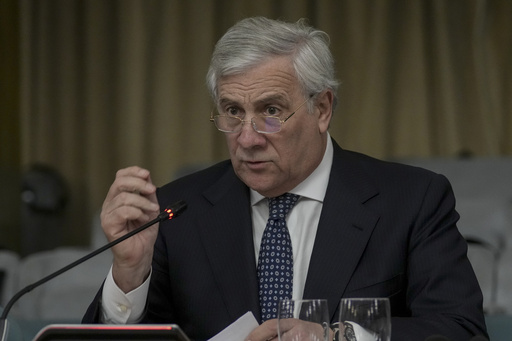
ROME — On Monday, foreign ministers from some of the world’s leading industrialized nations convened, focusing on the ongoing conflicts in Ukraine and the Middle East, which are reaching critical stages. This meeting comes at a time of heightened urgency to advance diplomatic efforts before the incoming U.S. administration takes charge.
At the Group of Seven (G7) gathering taking place near Rome, the primary focus is on negotiating a cease-fire in Gaza and Lebanon. The ministers from Canada, France, Germany, Italy, Japan, the United Kingdom, and the United States are meeting to discuss these pressing issues. On the first day of this two-day event, they are joined by counterparts from Saudi Arabia, Egypt, Jordan, the United Arab Emirates, Qatar, and the Secretary General of the Arab League.
The Italian foreign ministry indicated that the discussions will center on supporting initiatives to achieve a ceasefire in the affected regions, aid to the populations in need, and establishing a credible political solution for stability.
The “Quint” group, consisting of the U.S., Saudi Arabia, Jordan, Egypt, and the UAE, is working towards finalizing a strategy for the post-conflict scenario in Gaza. There is significant pressure to progress on this front before the Trump administration begins in January, as President-elect Donald Trump is expected to adopt a pro-Israel stance that may overlook Palestinian aspirations.
Italian Foreign Minister Antonio Tajani recently added another significant topic to the G7 agenda: the International Criminal Court (ICC) issuing arrest warrants for Israeli Prime Minister Benjamin Netanyahu, along with the country’s former defense minister and the military chief of Hamas. Italy, a founding member of the ICC and the host of the conference that established it in 1998, has adopted a supportive stance towards Israel following the Hamas attacks on October 7, while also extending humanitarian efforts to the Palestinians in Gaza.
Italy’s government is taking a balanced approach, reaffirming its respect for the ICC but expressing concerns about the political motives behind the warrants. Italian Premier Giorgia Meloni emphasized that Israeli state responsibilities should not be equated with those of Hamas, reflecting similar statements made by U.S. President Joe Biden.
Nathalie Tocci, who leads the Institute for International Affairs based in Rome, noted that Italy is aiming to achieve a unified stance among the six G7 nations that are ICC signatories, excluding the U.S. However, she cautioned that this move could be precarious, given that U.S. opinions often shape the G7’s overall direction and have already criticized the warrants as unacceptable.
Tocci warned that failure to uphold the principles of international law among the G7 nations would undermine its authority and ultimately harm their interests, recalling Italy’s reliance on international law for the protection of its peacekeepers in southern Lebanon.
The situation in Ukraine is another critical topic on the G7 agenda, especially following Russia’s recent missile attack, which has escalated the more than two-year conflict. Ukrainian Foreign Minister Andrii Sybiha is set to attend the G7 on Tuesday, coinciding with NATO and Ukrainian emergency talks in Brussels.
Russian President Vladimir Putin characterized the missile strike as a response to Ukraine’s use of longer-range missiles supplied by the U.S. and the U.K., which can target deeper within Russian territory. The G7 has been instrumental in providing military and economic assistance to Ukraine since Russia’s invasion began in February 2022. There are rising concerns among G7 members regarding how a potential Trump administration might alter U.S. foreign policy towards Ukraine.
Trump has openly criticized substantial financial assistance provided to Ukraine under the Biden administration, claiming he could resolve the conflict within a day—implying that such a resolution may involve pressuring Ukraine to relinquish territory taken by Russia. Italy has shown unwavering support for Ukraine and has endorsed the U.S. decision to equip Ukraine with longer-range missiles. However, Italy has adhered to its constitutional commitments against militarism by refusing to send offensive weaponry meant for strikes inside Russia, opting instead to supply anti-air defense systems aimed at protecting Ukrainian civilians.
The G7 foreign ministers’ meeting is being held in the historical town of Fiuggi, a renowned spa destination, and represents the second such gathering under Italy’s presidency, following an earlier meeting in Capri. On Monday, which coincides with the International Day for the Elimination of Violence against Women, ministers are set to inaugurate a symbolic red bench, representing Italy’s commitment to combating gender-based violence.
This weekend, tens of thousands participated in protests in Rome against gender-based violence, which statistics show has resulted in the tragic loss of 99 women’s lives in Italy this year, according to recent research by the Eures think tank.
